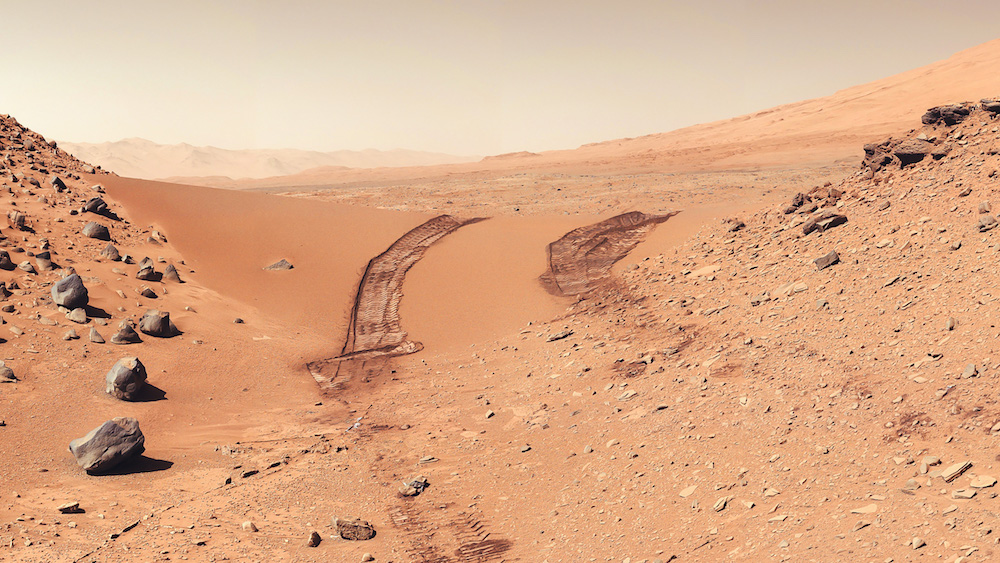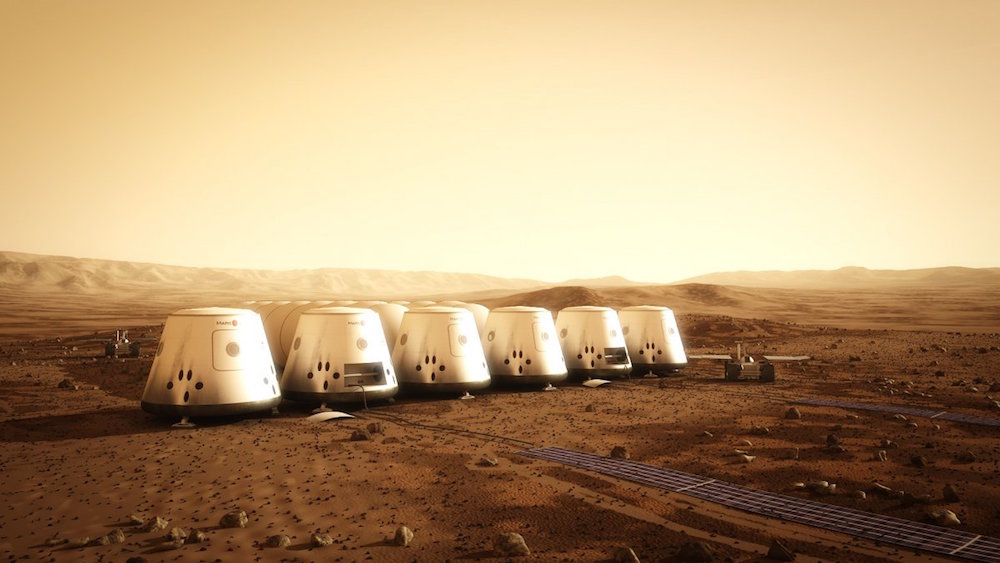Let's Become an Interplanetary Species
The only meaningful pursuit that we, as a species, can engage in is space exploration and colonization. Everything else is secondary. Let me explain.
 NASA’s Curiosity driving by a dune. Credit: NASA JPL
NASA’s Curiosity driving by a dune. Credit: NASA JPL
Life on Earth is a stubborn entity. Sometimes it feels like that all life is good for is survival optimization under constantly changing conditions of the environment. May be evolutionary stubbornness is a universal property and life shares it everywhere in the Universe. Yet, the only kind of life we’ve ever known exists and thrives on Earth. For now.
Life Is in Danger
Earth experienced five major extinction events when living populations went down to a fraction of what they used to be before the event.
 Artist’s impression of the asteroid that killed dinosaurs. Credit: unknown
Artist’s impression of the asteroid that killed dinosaurs. Credit: unknown
Extinction events were caused by different factors: global cooling, global warming, asteroid impact, oceanic overturn, supernova, and some others. I truly believe that if those events were studied more diligently at schools, we would have a better society and political systems across the globe. For one thing, we, as a species, would’ve focused more on long and extra long-term goals.
Long-Term Goals
What are those “long-term goals”? The answer probably depends on individual opinions and societal biases of those you ask but there are several common themes that come up regardless of whom you talk to. Those are usually considered to be humanity’s most audacious goals and problems of the highest importance. They are also, generally, wickedly hard to solve.
Slowing down and reversing human-caused climate change, curing cancer and other life-threatening diseases, eradicating poverty, decreasing suffering in war-ridden regions, fighting social injustice, answering the most fundamental questions about the world . . . Problems like that is what drives true technological innovation and positive social changes. But none of it matters in the long term if we don’t solve one problem that’s been haunting life on Earth for the past 3.5 billion years: survival.
Before I focus on this problem specifically, I’d like to explore why we should care so much about long-term problems in general.
Humans are made out of atoms and follow the same laws like all the other entities in the Universe. Humans are also quite special (at least on Earth) because we possess certain qualities—byproducts of evolution—that give us urges that other lifeforms don’t have: an unexplained desire to explore the Universe outside of our own planet, search answers to the most important questions (What is consciousness? Are we alone in the Universe? Why is there something rather than nothing?), and focus on high-level problems outside of our immediate circle of responsibilities.
Neil deGrasse Tyson once said:
“We are part of this Universe; we are in this Universe, but perhaps more important than both of those facts, is that the Universe is in us.”
 Hubble image of the Antennae galaxies. Credit: B. Whitmore and James Long
Hubble image of the Antennae galaxies. Credit: B. Whitmore and James Long
It’s a beautiful thought. If you use it as a guiding principle in further intellectual exploration of the meaning behind grand long-term goals it becomes clear that answering fundamental questions and exploring is something that we must do to fulfill our purpose as Universe’s way to cognize itself.
Survival Is a Problem
Back to survival now . . . Why focus on it? Well, for one thing, surviving is what we are supposed to be doing as a successful life form—it’s part of our genetic program. Secondly, I believe, purposeful survival is one of those special human qualities that I talked about earlier.
Everything we do here on Earth will be eventually destroyed. If we manage to not kill ourselves in the next few hundred years because of a nuclear conflict, depleted natural resources, or climate change there are still other immediate external dangers. Large asteroid impacts, supernovas, supervolcanoes, solar flares, and other destructive events happened many times in the history of Earth. There is no reason to believe that they won’t ever happen again. To be blunt: we are living on borrowed time. Even if nothing happens, which is, again, extremely unlikely, life on Earth will meet its ultimate demise when the expanding Sun dries up the oceans in less than two billion years.
This is sort of a dark picture. It doesn’t get better when you think about how dysfunctional the mankind really is. The majority of the population in poor countries suffers on a daily basis and struggles for survival. In rich countries many of us are collectively sitting in front of TVs watching degenerate shows, drinking soda, and eating junk food. On the other end of the spectrum, some of the brightest minds are wasting precious time and resources solving “first world problems.”
Thankfully, not everything is bad. If anything, there are more reasons to be optimistic about long-term goals and survival today than ever before. There are many entrepreneurs, makers, engineers, scientists, doctors, teachers, writers, artists, and even some politicians out there that are trying to focus on things that are above the mundane.
Solutions Are Hard but Achievable
How do we survive? What do we need to survive? The only scientific way of survival that we know of is to become an interplanetary and, eventually, interstellar species. I call it priority number one. It really is simple: if Earth becomes uninhabitable we’ll have more locations where we can thrive, be it other planets or star systems.
This goal ought to transcend all other human activities and pursuits.
 This is what one of the first Martian colonies could look like. Credit: Bryan Versteeg/Mars One
This is what one of the first Martian colonies could look like. Credit: Bryan Versteeg/Mars One
To go interplanetary we have to do four things:
- Invest heavily in relevant science and engineering. Those two fields are key to building spaceships, surviving space travel, and establishing independent colonies on other planets.
- Educate our fellow citizens on whose behalf those ships and colonies are going to be built. Citizens are also direct donors for scientific research and technology through tax dollars and consumerism.
- Elect politicians with relevant agendas. Our political system is rigged but it’s not an excuse to not use it to our advantage since it’s one of the only ways to affect policy.
- Work on inspirational art, videos, music, books, TV shows, and movies. When the going gets tough it’s critical to be able to draw inspiration from something.
What can you personally do to help humanity survive by becoming an interplanetary species? Surprisingly, there are many things of varying levels of importance that can be done by anyone:
- Get educated in science or engineering.
- Work in relevant fields: research, aerospace, mechanical engineering, electrical engineering, software (not “first world problem” startups), education, and politics.
- Spread the word: write articles, organize meetups, and have conversations with lots of people.
- Educate: teach STEM subjects and volunteer to lecture whenever there is opportunity.
- Motivate: create art, write books, shoot videos and movies. Anything helps.
- Most importantly, question your everyday actions: ask why you do certain things. Then ask some more whys until you get to the root cause of your true motivations. If they don’t align with priority number one—cut them out of your life.
Survival of the species is the most difficult and important challenge that the human race has ever had to deal with. It’s a group effort and it’s a long process that we have to collectively support. Personally, I’m bullish on our ability to survive and create settlements on other planets. It’s definitely within our reach. We just have to push ourselves to work towards it more.